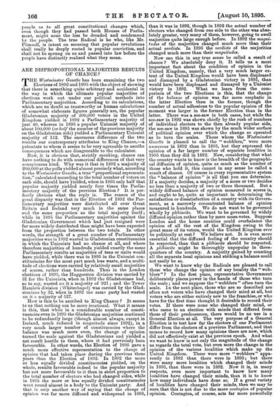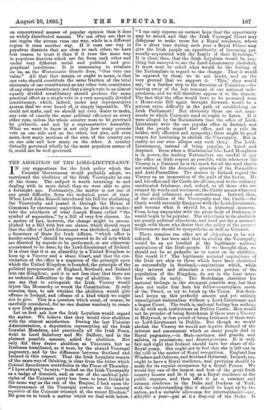ARE DISPROPORTIONAL MAJORITIES RESULTS OF CHANCE? T HE Westminster Gazette has
been examining the two Elections of 1892 and 1895 with the object of showing that there is something quite arbitrary and accidental in the way in which the ultimate popular majorities of elections work out under our political methods into Parliamentary majorities. According to its calculations, which are no doubt as trustworthy as human calculations of somewhat elaborate figures generally are, the popular Gladstonian majority of 200,000 voters in the United Kingdom yielded in 1892 a Parliamentary majority of just 40, whereas in 1895 a popular Unionist majority of about 100,000 (or half the number of the previous majority on the Gladstonian side) yielded a Parliamentary Unionist majority of 152. The enormous difference of the two results our contemporary attributes to King Chance,—a potentate to whom it seems to be very agreeable to ascribe consequences which are disagreeable to the calculator.
Now, it is obvious that, strictly speaking, chance can have nothing to do with numerical differences of that very conspicuous kind. Why was it that in 1892 a majority of 200,000 at the polls yielded almost precisely what, according to the Westminster Gazette, a true "proportional representa- tion," calculated according to the total number of voters on each side, should have 'yielded, when in 1895 only half that popular majority yielded nearly four times the Parlia- mentary majority of the previous Election ? It is per- fectly obvious what the reply is. The reason of the great disparity was that in the Election of 1892 the Par- liamentary majorities were distributed all over Great Britain and Ireland very much in the same places and the same proportion as the total majority itself ; while in 1895 the Parliamentary majorities against the Gladstonian Government which had just resigned were far more widely distributed than might have been expected from the proportion between the two totals. In other words, the strength of a great number of Parliamentary majorities was in 1892 wasted in Gladstonian constituencies in which the Unionists had no chance at all, and where therefore majorities of hundreds yielded exactly the same Parliamentary results as majorities of tens or units would have yielded, while there was in 1895 in the Unionist con- stituencies for the most part much less waste, and a multi- tude of elections were carried by relatively small majorities of scores, rather than hundreds. Thus in the London elections of 1895, the Haggerston division was carried by 31 for the Unionists, when in 1892 the Gladstonia,ns had, so to say, wasted on it a majority of 921 ; and the Tower Hamlets division (Whitechapel) was carried by the Glad- stonians by 32, when in 1892 the same party had wasted on it a majority of 527.
How is this to be ascribed to King Chance ? It seems to us that nothing can be more irrational. What it means is this, that while in a considerable number of consti- tuencies even in 1895 the Gladstonian majorities continued to be redundantly large (though almost always, except in Ireland, much reduced in magnitude since 1892), in a very much larger number of constituencies where the balance was much more even, the change of opinion turned the scale against the Gladstonians and yielded a net result hostile to them, where it had previously been favourable. In other words, the Election of 1896 gave a much more effective representation to the change of opinion that had taken place during the previous three years than the Election of 1892. In 1892 the more or less equally divided constituencies yielded, on the whole, results favourable indeed to the popular majority but not more favourable to it than in strict proportion to the total number of electors who had changed sides, while in 1895 the more or less equally divided constituencies went round almost in a body to the Unionist party. And that is only another way of saying that the change of opinion was far more diffused and widespread in 1895, than it was in 1892, though in 1892 the actual number of electors who changed from one side to the other was abso- lutely greater, very many of them, however, going to swell majorities quite large enough before. In 1892 the magni- tudes of the majorities changed much more than their actual verdicts. In 1895 the verdicts of the majorities changed much more than their magnitudes.
Now can this in any true sense be called a result of chance ? We absolutely deny it. It tells us a most important fact about the condition of opinion in the United Kingdom, namely, that a very much larger ex- tent of the United Kingdom would have been displeased and dismayed by a Gladstonian victory in 1895, than would have been displeased and dismayed by a Unionist victory in 1892. What we learn from the com- parison of the two Elections is this, that the change of the balance of opinion was far more emphatic in the latter Election than in the former, though the number of actual adhesions to the popular opinion of the moment was larger in the former Election than in the latter. There was a see-saw in both cases, but while the see-saw in 1892 was shown chiefly by the rush of numbers of individual electors to the then already popular side, the see-saw in 1895 was shown by the much wider surface of political opinion over which the change so operated as to turn the scales. Those whom the Westminster Gazette is pleased to call the " wobblers," were more numerous in 1892 than in 1895, but they expressed the opinion of a far larger number of separate localities in 1895 than they did in 1892. Now, considering that what the country wants to know is the breadth of the geographi- cal diffusion of opinion, quite as much as the number of those who hold it, this cannot in any sense be called a result of chance. Of course in every representative system the "balance of opinion" is all that you can determine. If a majority decides, a majority of a score or two decides no less than a majority of two or three thousand. But a widely diffused balance of opinion measured in scores is, and ought to be, quite as important in determining the satisfaction or dissatisfaction of a country with its Govern- ment, as a narrowly concentrated balance of opinion measured in hundreds. We do not want to be governed wholly by plebiscite. We want to be governed by widely diffused opinion rather than by mere mass-votes. Suppose London and the home counties could overbalance the opinion of all the rest of the Kingdom owing to the great mass of its voters, would the United Kingdom ever be politically at rest ? We believe not. It is even more essential that the diffused feeling of the country should be respected, than that a plebiscite should be respected. A plebiscite might be thoroughly unpopular in three- quarters of the country. A majority gained by counting all the separate local opinions and striking a balance could not easily be so. We want to know why the Radicals are pleased to call those who change the opinion of any locality the " wob- biers " ? In the first place, representative Government deliberately places power in the hands of those who turn the scale ; and we suppose the " wobblers " often turn the scale. In the next place, those who are so described are often not voters who have changed their mind at all, but voters who are either entirely new to the franchise, or who have for the first time thought it desirable to record their votes. If there were none who changed their mind, or who came to an election with minds that differed from those of their predecessors, there would be no use in a General Election at all. The very purpose of a General Election is to test how far the electors of one Parliament differ from the electors of a previous Pailiament, and that means to record how many opinions there are now, which did not effectively exist at the previous epoch. And what we want to know is not only the magnitude of the change as regards the total vote, but even more the change in the opinion of the various localities which make up the United Kingdom. There were more " wobblers " appa- rently in 1892 than there were in 1895; but there were many more localities which changed their minds in 1895, than there were in 1892. Now it is, in many respects, even more important to know how many localities have changed their minds, than it is to know how many individuals have done so. If a great variety of localities have changed their minds, then we may be sure that this is not due to the mere contagion of popular opinion. Contagion, of course, acts far more powerfully on concentrated masses of popular opinion than it does on widely distributed masses. We can often see that in one region the stream runs one way, while in a different region it runs another way. If it runs one way in populous districts that are close to each other, we have less reason to trust it than if it runs the same way in populous districts which are far from each other and under very different social and political and geo- graphical conditions. It is unmeaning to retaliate on us, as the Westminster Gazette does, "One vote one value." All that that means, or ought to mean, is that one vote should constitute the same fraction of the total electorate of one constituency as any other vote constitutes of any other constituency, not that a single vote in an almost equally divided constituency should produce the same practical effect as a single vote in a very unequally divided constituency, which, indeed, under any representative system that we ever heard of, is simply impossible. We could not make, and we should not even desire to make, any vote of exactly the same political efficiency as every other vote, unless the whole country were to be governed by ple'biscite, and not by a representative Assembly. What we want to know is not only how many persons vote on one side and on the other, but also, and even more, how many sections of the area of the country are on one side and how many on the other. A country firtually governed wholly by the most populous corner of it, could not be well governed.



































 Previous page
Previous page